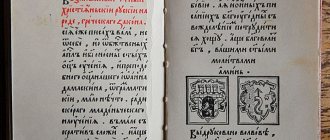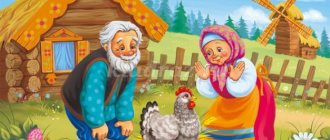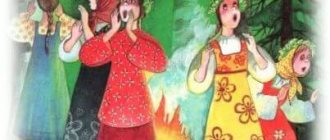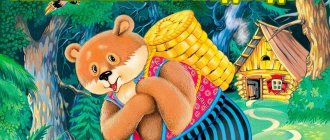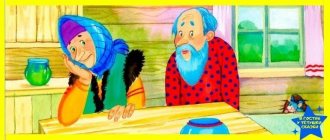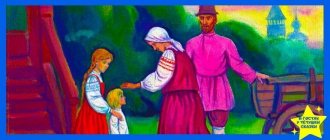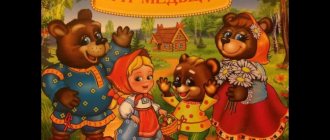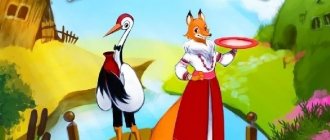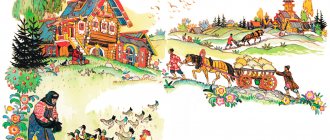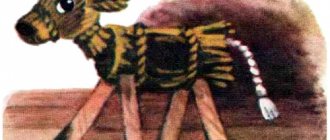Heritage Word
The tale of the Ryaba Hen is extremely short and seemingly simple, but in fact it is extremely paradoxical and incomprehensible. Why do Grandfather and Grandmother first try to break the Egg, and when the Mouse does it, they cry? Why couldn’t they break the Egg, but the Mouse did it easily and without any effort, just by waving its tail? Why is the promised simple Egg better than a broken golden one?
It is obvious that here - as in all Russian folk tales - something allegorical is conveyed in a metaphorical form, some deep wisdom of generations
, and having deciphered it, you can touch the knowledge that was formed at the dawn of civilization.
But how do we know that we are on the right track? The symbolism of the “Ryaba Hen” is ambiguous
, and can be interpreted in completely different ways, however, perhaps there is no need to try to choose one “correct” explanation, because
all or almost all existing interpretations are “correct” in their own way and for a certain level of perception of reality
.
Like many layers of an onion, or like “a needle in an egg, an egg in a duck, a duck in a hare, a hare in a chest...”
.
Let's consider all versions from everyday and instructive to sacred and cosmogonic.
Analysis of the fairy tale Chicken Ryaba
The child's life experience makes the fairy tale attractive to him. All the actions that the characters perform are clear to him: “egg”, “beat but didn’t break”, “the mouse broke”, “crying”, “the chicken calms down”. This is a chain of emotions understandable to a little man, which he expresses when he listens to a fairy tale: interest, grief, compassion, reassurance. This is the secret of the popularity of the fairy tale among the little ones. For adult uncles and aunts, a short, simple children's fairy tale with traditional heroes - a grandfather and a woman - is easy to retell, but it is not easy to explain the behavior of the characters. If the egg is golden, why break it? If an egg breaks, why cry? Yes, the meaning of the fairy tale Ryaba Hen is not easy to explain: happiness in the form of a golden egg left Grandfather and Baba because they were unable to keep it; but perhaps a simple (egg) human happiness will be enough for an ordinary person, which he will learn to appreciate.
“Ryaba Hen”: interpretation, hypotheses, versions
The instructive meaning of the fairy tale about “Ryab the Hen”
If we take the text of A. N. Afanasyev as a basis for analysis (a cyclical narrative, there is no golden egg at all, a simple egg is broken, after which a series of inadequate and therefore comical reactions and consequences occur), then the meaning of the fairy tale turns out to be purely everyday: do not stand too violently react to everyday things
.
Or - you shouldn’t create problems from scratch. Or - giving too much significance to events that do not deserve it leads to unnecessary frustration and negative consequences. And so on. This concept ridicules human stupidity, the inability to think soberly and logically.
Therefore, from this point of view, the moral of the tale is to elevate your reason over your emotions, and control them from the height of your personality,
but not vice versa. If the human mind is weak, then emotions are always erroneous, drunken, exaggerated, and this, in turn, gives rise to fussiness and suspiciousness.
The meaning of the fairy tale “Ryaba Hen” from an Orthodox point of view
Interpreting Russian folk tales through the prism of Christianity is a rather controversial exercise, because they are essentially a product of the pre-Christian world.
These ancient images were initially created and developed outside the Christian paradigm, therefore their meaning cannot in any way be deduced from the Christian picture of the world. Coincidences here are more likely to be random, and conclusions will be distorted. However, to complete the picture, we will also give an interpretation of the tale of “The Ryab Hen” from an Orthodox point of view. Orthodoxy interprets this legend as the need for God
.
A random event should be perceived by
Grandfather and Grandmother
as His providence
, because He is omniscient and omniscient. There is no event that was not foreseen by Him. That is, the source of life is God's moral law, and not a trick of chance or, in a sense, of the Devil. The Golden Egg in this case can be interpreted as a sign of excess wealth, and the image of the Mouse can be interpreted as a person’s inability to predict the future.
The main characters are not a Man and a Woman, not a Boy and a Girl, but Grandfather and Grandmother. Firstly, these are heterosexual creatures, like Adam and Eve, a symbol of all humanity. Secondly, these heroes are a demonstration of the inevitable - old age, that is, a kind of reminder that the transition to Hell or Heaven, depending on earthly actions, is inevitable.
The philosophical meaning of the fairy tale “Hen Ryaba”
In the story, Grandfather and Grandmother intend to break the golden egg, but are upset when a mouse does it. In ancient times, gold was often associated with death
.
Perhaps this is due to the process of its extraction - from underground and in difficult conditions. In general , everything underground was traditionally associated in folklore with the afterlife - it was associated with burial rites
.
Moreover, fairy-tale characters who are in a borderline state are traditionally associated with gold. For example, Koschey - “the living dead” - “wasting away over gold
.
Vsevolod Ivanov . In the palace of Kashchei
In turn, the Egg was a symbol of life, rebirth
.
But encased in “gold” it is no longer alive. This is not just death, but life nailed into some kind of bonds, anti-life , and according to some versions - pure evil.
Life proceeds correctly only if there is development, and golden shackles are what prevent it from developing. Grandfather and Grandmother, looking at this, strive to release life and restore balance.
Mouse from the cartoon “The Wonderful Bell”, 1949
The mouse, as a mediator between life and death, acts as a “providence” - an accident or fate.
When she breaks the egg, Grandfather and Grandmother are disheartened because the egg turns out to be hollow, which means there is no hope of receiving a “second” life or immortality.
By the way, the Mouse, as a symbol of chance , impermanence, and unexpected changes, appears in many fairy tales
. For example, in “Morozko”, a timely fed mouse becomes a salvation for a girl, and helps her win a dangerous game with the Bear, and as a result, return home with rich gifts.
Then the Chicken gives new hope. It is the Ryaba Hen - a symbol of forgiveness and salvation - she promises to create a new life
, save Grandfather and Grandmother from existential torment.
In many ways, the functions of Ryaba are similar to the functions of God, if we judge him from the point of view of religion, and the appearance after the golden hollow egg of something that brings life is the transformation of death, in a sense, immortality
.
Easter
eggs-pysanka .
Painting in the traditions of the Lusatian Serbs - a Slavic ethnic group in Germany It is interesting that the image of an egg as a symbol of eternal life was used both in ancient times and in late Christian times - right up to the present day. Let us remember the custom of painting and breaking eggs at Easter.
The sacred “cosmic” meaning of the fairy tale Chicken Ryaba
This interpretation originates from the etymology of the words
, which are used to name the main characters of the tale.
The root “star-” in Russian means antiquity and a certain STARShinsto
: old man, old woman, old woman (an ancient abandoned river bed), old times, old times (imitate old times), old man, foreman, stry (father’s brother) ... Compare with English.
“star” - literally - old, like “star”. That is, Grandfather and Grandmother - the Old Man and the Old Woman - symbolize a certain common accumulated wisdom of generations
and at the same time represent
two principles - male and female
.
The chicken represents Mokosh (or Makosh) - a Slavic goddess associated with crafts and fate
. Mokosh controls Time and Fate, keeps the hearth and gives abundance. Her image is inextricably linked with a spindle, a thread, the weaving of destinies or the fabric of the universe.
Alexander Uglanov. Makosh
And why Ryaba? The epithet “ripple” can be interpreted in the context of the words “ripple”, “pockmarked”
- that is, with spots of a different color on the main background.
As a result, we have a certain integrity (cosmos) consisting of many elements (infofield) - it is precisely this understanding of the structure that physicists
are approaching today .
If you use the Old Russian words, it turns out that “ripple”
-
“something bright, shimmering, beautiful, consisting of threads or a motley repeating pattern”
(“ryasno” - decoration; “cassock” - thread; “ryat” - clarity or brightness) + suffix “ba” meaning “process” (gulba, threshing, walking, etc.).
It turns out that Ryaba is a living shimmering cosmos
(perhaps dark matter or the noosphere in the sense of some potential ready to be revealed), and
Ryaba Hen
is the cosmic part of Mokoshi, that is,
the intelligent and self-governing outline of the universe, the creative and ever-evolving Universe.
The Spiral Nebula in the constellation Aquarius
The egg is a common cultural symbol of the beginning and end of life. Golden egg - living in non-living
. Grandfather and Grandmother's attempts to break it speak of an unsuccessful struggle against the inevitable.
Mouse is a sacred image
, which is used in one way or another in the legends of almost all peoples of the Earth.
It is curious that most often the mouse is neither a positive nor a negative character, but rather a kind of paradoxical hero
who appears unexpectedly and does not act according to some kind of his own plan/algorithm, not related to the general logic of the development of events.
It is often associated with the theme of Death as a transition to some new state
. Linguist O. N. Trubachev, having studied M. Vasmer’s dictionary, noticed that mouse (Indo-European mūs - “gray”) is one of the Indo-European taboo names (by analogy with “bear” - “knowing honey”).
Milky Way
By the way, the popular name for the “Milky Way”
also associated with the mouse - our ancestors often
called it the “Mouse Trail”
(read more about the Old Russian names of constellations about the Old Russian names of constellations). In ancient Indian legends, the Milky Way was created by the milk that flowed from the teats of the Cow Zemun (Mokosh).
An interesting logical chain is discovered when examining various images of the goddess Mokoshi
: she is
the creator
(the one who holds the threads of Fate in her hands, weaves the outline of the universe), and
Share, and Nedolya, and Mara
, and - finally,
the personification of the End - that is, the Mouse
(note the consonance of the words mouse and Makosh)!
In this dimension, the goddess is perceived as death, and the tail with which the mouse broke the egg is the end of an era, where the “golden” (ossified, dying) life dies and a new one is reborn - simple, living, “real”.
The general sacred meaning of the tale is as follows: in the power of Mokosha both the birth of the world and its death
.
At the same time, the processes of completing the old and creating a new one are cyclical
- that is,
there is no death as such, because it is always followed by a new life
and this constant cycle is development.
Cosmic dying and rebirth are continuous like breathing and inevitable like fate
. At the same time, people’s desires in this case do not play a big role - by trying to complete the cycle ahead of time or start it, they turn out to be powerless. Probably, Grandfather and Grandmother, as the personification of humanity, must learn to appreciate the current moment and realize that earthly life (a simple egg) is the highest reward, while the golden shell is not so much death as a transitional state between the completion of a worldly stage and esoteric rebirth .
Vedic meaning of the tale of the Golden Egg
Images of a fairy tale familiar to us can also be found in the Indian Vedas, created more than five thousand years ago. Thus, orientalist and religious scholar S. Zyuzko in the article “Vedic roots of Russian fairy tales” writes that Brahma
- an inhabitant of the highest levels of the universe and the creator of new worlds -
creates the Universal Egg with the help of certain mantras
.
The sacred syllable “OM” gives him the knowledge of exactly how to create this world
(more about the creation of worlds through sound - in the article about the harp).
It is noteworthy that in Sanskrit the higher worlds where Brahma lives are called “svarga” - almost like the Creator God Svarog
in Slavic mythology.
It is he who is probably presented in the fairy tale about the Ryaba Hen in the form of an Old Man or Grandfather,
while the Old Woman is his wife and companion -
the goddess Lada
(remember the often repeated refrain of Russian ritual songs -
“Oh Did Lado”
).
Mouse
- a “chthonic”
creature personifying the “earth”
, that is,
the process of breaking a golden egg by a mouse in this case is interpreted as the separation of the earth/firmament from the universal waters
in which the Golden Egg initially floated.
By the way, the Vedas also emphasize the golden color of the Egg,
or rather, the infinite space of Eggs (remember the “ripples” of the Ryaba Hen), each of which is a golden cosmic egg that becomes alive with a new cycle of “universal inhalation-exit” (analogous to the scientific theory of the big bang):
“Divine seeds are born from the pores of
Maha-Vishnu in the form of endless golden eggs. These golden grains are covered with the five main material elements. In his expansions, Maha-Vishnu enters each of the Universes, each of the cosmic eggs.”
_________
The true meaning of the fairy tale “Ryaba Hen” is perceived not by the mind, but by the subconscious. From century to century, the peoples of the earth accumulated wisdom and passed it on in the form of image codes that permeate all truly folk tales. A simple form, adapted for oral transmission, made it possible to preserve this knowledge and deep semantic content and convey it to us today for thousands of years.
Russian story
Saratov region
Dear egg
There lived an old man and an old woman. And they had an old hazel hen. She laid an egg in the canopy on a shelf, on rye straws. Wherever the mouse came from, it split this egg. The grandfather is crying, the woman is grieving, the magpie has broken her leg, the backbone has become loose, the oak tree has knocked off its leaves. The priest's daughter went for water, broke the buckets, and came home without water. Popadya asks: “Why are you daughter, did you come without water?” She says: What grief is upon me, how great is it upon me: “Once upon a time there lived an old man and an old woman. And they had an old hazel hen. She laid an egg in the canopy on a shelf, on rye straws. Wherever the mouse came from, it split this egg. The grandfather is crying, the woman is grieving, the magpie has broken her leg, the backbone has become loose, the oak tree has knocked off its leaves. And I went for water, broke the buckets, broke the rocker. At least leave the pies out of the window out of grief!” The priest got upset and threw the pies out the window. The priest goes: “What are you doing, priest?” And she replies: “What a grief it is for me, how great it is for me. There lived an old man and an old woman. And they had an old hazel hen. She laid an egg in the canopy on a shelf, on rye straws. Wherever the mouse came from, it split this egg. The grandfather is crying, the woman is grieving, the magpie has broken her leg, the backbone has become loose, the oak tree has knocked off its leaves. Our daughter went to fetch water, broke the buckets, and broke the rocker. And out of grief, I left all the pies out the window. And you, priest, at least hurt yourself on the doorframe out of grief!” The priest ran away, and how he hit the doorframe! That's where he died. They began to bury the priest and celebrate a wake. What an expensive egg!
(Tales of the Saratov region. Saratov, 1937. pp. 147-148).
Voronezh region
Ruffed chicken
Once upon a time there lived a grandfather and a woman. And they had a hazel grouse chicken. The chicken was not a simple one, which means it laid golden eggs. Here the hazel grouse laid a golden egg, such a large one, it’s a pleasure to look at. Grandfather saw the egg and called grandmother. They began to praise the hazel hen. And then the grandfather says: “Put the egg in a good place so that it can be seen. Well, they put it in. They put it in and can’t stop looking at it. We admired it all day. And my grandparents had a purring cat, very angry with mice. And when my grandfather and grandmother went to bed, the purr began to run after the mouse. I thought about eating it. The mouse goes here and there - there’s no escape from the cat. She saw the egg, wanted to hide behind it - and dived onto the shelf. But the egg on the shelf could not resist and fell to the floor and broke. Grandfather and grandmother get up in the morning. Let us, they think, admire the egg. Lo and behold, there is no egg on the shelf. It's lying on the floor and everything is broken as it is. Grandfather and grandmother began to cry and went to complain to the hazel grouse. And the chicken says to them: “Don’t cry, grandfather, don’t cry, grandmother!” The hazel hen will lay you another golden egg, better than the first.”
(From Natalya Mikhailovna Danshina (1892), Krasovka village, Gribanovsky district, in 1969 // Folk tale of the Voronezh region. Modern records. Voronezh 1977 ed. Kretov. Page 17, No. 1.)
Vologda region
There was an old man and an old woman
There was an old man and an old woman. And they had a mottled chicken. She laid an egg from Kot Kotofeich under the window on a scrap of fur coat. Look, the mouse jumped out, returned it with its tail, blinked its eye, kicked its foot, and broke the egg. The old man is crying, the old woman is crying, the broom is plowing, the mortar is dancing, the pestles are pounding. The priest's girls went out to the well to get water, and they were told that the egg had been broken. The girls broke the buckets out of grief. They told the priest that she planted pies under the stove without memory. They told the priest, and the priest ran to the bell tower to ring the alarm. The laity gathered: “What happened?” Here the laymen began to fight among themselves out of frustration.
(Sokolovs, 142. From Elizaveta Panteleevna Chistyakova, Pokrovskaya village, Punemsky volost, Kirillovsky district, Novgorod province.)
from the collection “Russian Folk Tales” by A. N. Afanasyev
TO
Just like our grandmother had a hazel hen in her backyard; The chicken planted an egg, from shelf to shelf, into an aspen hollow [4], into a cubby under the bench. The mouse ran, returned with its tail, and broke the testicle! About this testicle the system[5] began to cry, Baba began to sob, the faithful[6] began to laugh, Chickens began to fly, gates creaked; The rubbish under the threshold began to smoke, the doors began to shake [7], the wall crumbled; The priest’s daughters came with water, They broke the tub, They said to the priest: “You don’t know anything, mother! After all, in my grandmother’s backyard there was a hazel hen; The chicken planted an egg, from shelf to shelf, into an aspen hollow, into a cubby under the bench. The mouse ran, returned with its tail, and broke the testicle! The system began to cry about this testicle, Baba began to sob, and burst out laughing. Chickens are flying, the gates are creaking, the rubbish under the threshold is lighting up, the doors are shaking, the wall is crumbling; We walked with water and broke the tub!” The priest kneaded the kneading mixture - She scattered all the dough on the floor; I went to church, the priest said: “You don’t know anything... After all, in my grandmother’s backyard (The same story is repeated again.) ……… the tyn crumbled; Our daughters walked with water - The tub was broken, they told me; I kneaded the dough - I scattered all the dough!” The priest began to tear the book - he scattered it all over the floor!
Secrets behind seven seals
The egg is a deep symbol that personifies the universe. In light of this, it is not at all accidental that in some versions there was a commotion, chickens flew, gates creaked. But the egg is also a symbol of the birth of something new.
In Indian mythology, the god Brahma slept in a golden egg for a long time. Having awakened, he created the earth, the firmament, spirits and, finally, people from different parts of his body (which led to their division into castes). The emergence of the universe from an egg is a very expressive image. Interestingly, in this context it is golden. There is an association with sunlight.
In Greek mythology, an egg is a very interesting object. The beautiful Leda attracted the attention of Zeus himself. And he, taking the form of a swan, took possession of her. This resulted in several eggs being born by Leda. From one of them, Helen the Beautiful was born - the future involuntary culprit of the Trojan War. Such a peculiar thread stretched from a miraculous birth to destruction.
In literature , breaking an egg is not a simple process at all. How can one not recall Jonathan Swift’s “Gulliver’s Travels,” where there was a war between Lilliput and Blefuscu. And all because of a dispute about which end to break the egg from. The feud between the blunt-ended and the sharp-edged has become a common word for meaningless contradictions.
Still from the film “Gulliver in the Land of the Lilliputians.” Artist Erno Zorad Photo: malenkii-genii.ru
Ukrainian folk tales
Ukrainian folk kazka of Chernigiv region
The grandfather and woman were alive and there was a hen in them. She brought an egg, and it was not just gold, but gold. Did beat, beat without breaking. The woman beat and beat, but did not break. The bear ran across the bridge, hit with its tail, the egg fell and broke. Grandfather is crying, woman is crying, the chicken is clucking, the gate is creaking.
A magpie flew in, sat on the gate and fed:
- Why are you creaking like that?
- Oh, if you knew, magpie, you would have torn your own tail off!
- Yak yes yak?
- As if the grandfather and woman were alive, there was a pockmarked hen in them. She brought an egg, and it was not just gold, but gold. Did beat, beat without breaking. The woman beat and beat, but did not break.
The bear ran across the bridge, hit with its tail, the egg fell and broke. Grandfather is crying, woman is crying, the chicken is going crazy, the gate is creaking, the magpie has taken and torn off its tail.
A magpie flew into the forest, landed on an oak tree, and the tree feeds:
- Soroko, why did you pull your tail out?
- Oh, if you knew it, you would have broken yourself.
- Yak yes yak?
- As if the grandfather and woman were alive, there was a pockmarked hen in them. She brought an egg, and it was not just gold, but gold. Did beat, beat without breaking. The woman beat and beat, but did not break. The bear ran across the bridge, hit with its tail, the egg fell and broke. Grandfather is crying, woman is crying, the chicken is going crazy, the gate is creaking, the magpie has taken and torn off its tail.
Taking the oak tree on itself, it broke off. The sheep and rams come to graze. From and nourish oak:
- Duba, duba, what if you screwed yourself up?
- Oh, if you, sheep, knew, you would break your own horns.
- Yak yes yak?
- As if the grandfather and woman were alive, there was a pockmarked hen in them. She brought an egg, and it was not just gold, but gold. Did beat, beat - without breaking. The woman beat and beat, but did not break. The bear ran across the bridge, hit with its tail, the egg fell and broke. Grandfather is crying, woman is crying, the hen is in a hurry, the gate is creaking, the magpie took its tail and tore off the oak tree on its back.
Here the rams broke their horns. They went to the water to drink, and the water nourishes:
- Sheep, did you break your horns?
- Oh, if you, river, I knew, you would have dissolved the water in yourself.
- Yak yes yak?
- As if the grandfather and woman were alive, there was a pockmarked hen in them. She brought an egg, and it was not just gold, but gold. Did beat, beat - without breaking. The woman beat and beat, but did not break.
The bear ran across the bridge, hit with its tail, the egg fell and broke. Grandfather is crying, woman is crying, the hen is in a mess, the gate is creaking, the magpie has taken its tail and torn it off, the oak tree has broken on itself, and the ram’s horns have been broken.
Then the river took and poured water. Mother comes for water, pours water - there is no water.
- What is it? Where is the water?
“If you knew it, mother, you would have torn your underwear.”
- Yak yes yak?
- As if the grandfather and woman were alive, there was a pockmarked hen in them. She brought an egg, and it was not just gold, but gold. Did beat, beat - without breaking. The woman beat and beat, but did not break. The bear ran across the bridge, hit with its tail, the egg fell and broke. The grandfather is crying, the woman is crying, the chicken is in a mess, the gates are creaking, the magpie took its tail and tore it off, the oak tree broke, the ram's horns were broken, and the river spilled water.
Then mother tore her sleeping bag. When you come home, your father greets you.
- Mother, what’s with the empty buckets?
- Oh, what if you, father, if you knew, you would tear your beard.
- Yak yes yak?
- As if the grandfather and woman were alive, there was a pockmarked hen in them. She brought an egg, and it was not just gold, but gold. Did beat, beat - without breaking. The woman beat and beat, but did not break. The bear ran across the bridge, hit with its tail, the egg fell and broke. Grandfather is crying, woman is crying, the chicken is in a mess, the gate is creaking, the magpie took its tail and tore it off, the oak tree broke, the ram's horns were broken, the river spilled water, and the mother tore the spade.
Father took and tore his beard and said:
- From now on I won’t rule the service!
Dzherelo: Ukrainian folk tales in 40 books.
Recording, arranging and literary reviewing Mykola Zinchuk.
The text of the publications by Mikola Zinchuk and with his permission.
176 (4027). Ryabka hen. SUS 2022. Recorded by Mykola Zinchuk on June 29, 2007. Samoilenko Nadiya Petrivna (1950). Chernihiv region, Nosiv district, Ploske
Russian fairy tale
The fairy tale “Ryaba Hen” is a classic of folk tales
Who doesn’t know the famous Russian fairy tale about the chicken Ryaba?
From early childhood, all children are told this interesting story about the magical grouse hen by grandparents, mothers or fathers. The page with bright illustrations contains text and images of real works of art. They accompany the narrative, and children will be able to vividly imagine the characters and scenes from the Russian fairy tale. The beginning of the story is decorated with a beautiful picture with an egg, in which a richly dressed merchant and merchant’s wife proudly hold a golden hen with a basket of her precious gifts. The painting commemorates the Easter holiday, when all Orthodox Christians paint eggs in bright golden colors.
The heroes of the fairy tale are familiar to parents, and now it’s time to introduce them to children:
the grandfather is a simple peasant whose only wealth is his grandmother and a speckled hen. Grandpa loves his little dog very much, cares for her and cherishes her. When the mouse broke the golden egg, he cried and lamented, but the magic hen consoled him and promised to lay a new simple egg.
Baba , my grandfather’s wife, also loves a good hazel grouse. Feed her with selected barley and give her spring water so that the hen lays large eggs. Without eggs, grandma will not be able to knead the dough and bake a tall, ruddy loaf.
Chicken Ryaba is a magical quonka. She lays not ordinary eggs, but golden ones. Just don’t break these eggs and put them in the dough; they’re of little use when you want to eat. And you can’t sell it, it’s fragile like glass and when it breaks, it turns into small fragments. Ryaba wanted to bestow wealth on her grandfather and grandmother, but it turned out that simple eggs are much more important on the farm!
The gray mouse is a small pest. She climbs into barns and haylofts, drags everything that is in bad shape and gnaws on bags of winter supplies. The mouse let down the grandfather and grandmother when it brushed off an egg with its tail. She deprived the old people of their wealth, for which she received her grandfather’s big boot.
The ending of a fairy tale with deep meaning! The hen gave the old people a simple, not a golden egg. Because happiness in the home is not built on wealth, but on harmony, love and respect.
More about illustrations and Russian folk crafts
The children's fairy tale about Ryabushka is intended for family discussion and bedtime reading . Through each line of the book there are images with Gzhel stands, nesting dolls from Fedoskino, a black lacquer miniature from Mstera and figurines from the village of Kholui. Parents will be able to introduce their children to ancient works of folk art and plunge for a few minutes into the richness of Russian literature.
In conclusion, you can put headphones on your baby and let him listen to the audio version of the fairy tale . A measured narrative will allow the imagination to run wild, calm the child after a hard day and induce a good, healthy sleep. A filmstrip with slides will demonstrate a peasant hut and all the events that took place in the old fairy tale. Getting to know Russian folk art will strengthen your knowledge of the language and love for your native land!
Fairy tale No. 70 from the collection “Russian Folk Tales” by A. N. Afanasyev
Once
upon a time there was an old man and an old woman, they had a Tatar hen, she laid an egg in the closet [1] under the window: colorful, colorful, boney, tricky! I put it on the shelf; The mouse walked, shook its tail, the shelf fell, and the egg broke.
The old man is crying, the old woman is sobbing, the stove is on fire, the top of the hut is shaking, the girl-granddaughter hanged herself out of grief. Mallow[2] comes and asks: Why are they crying so much?
The old men began to retell:
- How can we not cry? We have a Tatar hen, she laid an egg in the hut under the window: motley, vostro, boney, tricky! I put it on the shelf; The mouse walked, shook its tail, the shelf fell, and the egg broke! I, an old man, am crying, the old woman is sobbing, the stove is on fire, the top of the hut is shaking, the girl-granddaughter hanged herself out of grief.
As soon as the breadmaker heard it, she broke all the bread and threw it away. The sexton comes up and asks the breadmaker: why did she throw away the bread?
She told him all the grief; the sexton ran to the bell tower and broke all the bells.
The priest comes and asks the sexton: why did you break the bells?
The sexton recounted all the grief to the priest, and the priest ran and tore up all the books.
